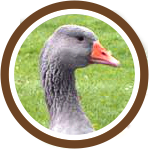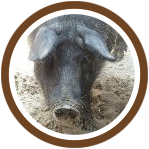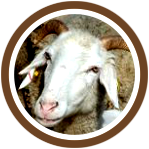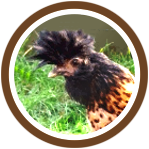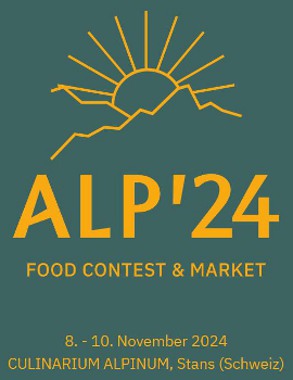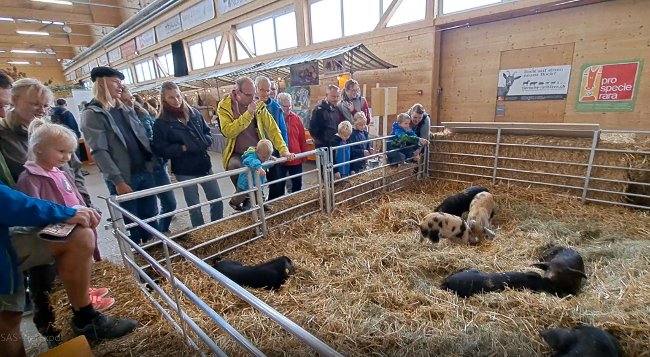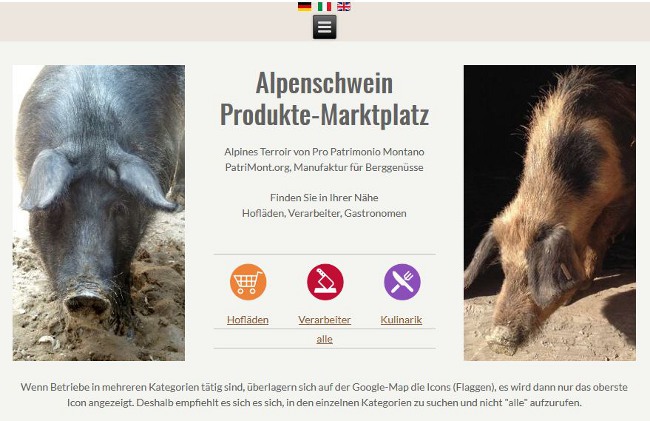Pavel Beco, co-initiator of PatriMont, deceased
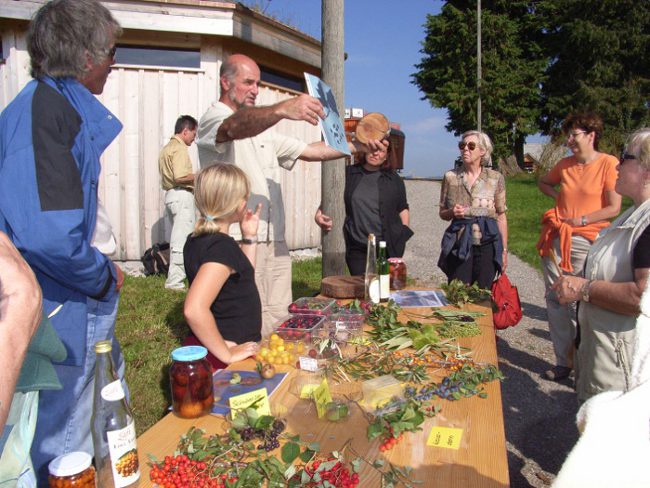
Pavel Beco, a pioneer for the preservation of agrobiodiversity in Europe and co-initiator of the Alpine network Pro Patrimonio Montano, has left us forever. He has achieved so much in Switzerland, the Alpine region and throughout Europe. May he now rest in peace!
Obituary by Hape Grunenfelder
1st International market and competition for regional products from the Alpine region
From November 8-10, the Culinarium Alpinum in Stans (Switzerland) will host the first International Market & Competition for Regional Products from the Alpine Region. The best products will be awarded medals by a jury. Producers of regional products from the Alpine region can download a flyer at www.alp24.ch and pre-register via this website.
Alpine pigs in the open-air museum Ballenberg
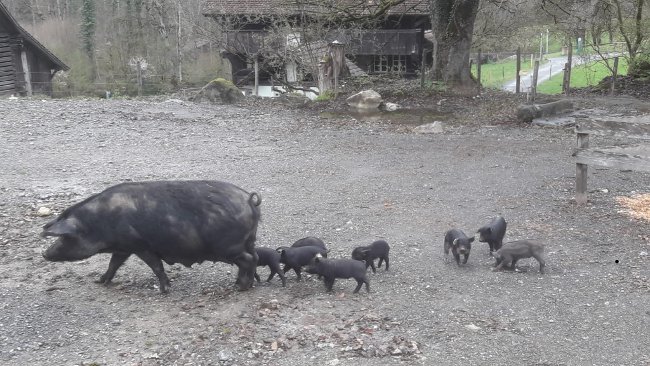
As already in the open-air museum Glentleiten in the Bavarian foothills of the Alps, in the nature and animal park Goldau in Central Switzerland, now also the Swiss open-air museum Ballenberg in the Bernese Oberland shows a breeding group of black Alpine pigs in a very spacious enclosure (Foto Silvan Amrein).
ProSpecieRara Animal Expo 2022 in Switzerland
At the Animal Expo of the Swiss ProSpecieRara Foundation, which takes place every five years, a group of Black and Pied Alpine Pigs participated for the first time this year. On 8 and 9 October, a flock of Alpine pigs consisting of a breeding sow with their 8 piglets delighted the visitors. With their play instinct, the group presented itself from its best side. At a parallel lecture event, the renewed development of the breeding in Switzerland and the started marketing of the products were highlighted.
"Marketplace" for Alpine Pig products
The alpine network PatriMont has opened a "Marketplace" that points out to the general public where to buy alpine pig products. The new website www.alpenschwein.market is based on Google maps. It uses various icons (flags) and contact details to point out farm stores, processors and catering establishments where Alpine Pig products can be purchased or enjoyed. Each business presents itself on a subpage with its own offers and benefits.
Group PatriMont-Switzerland established
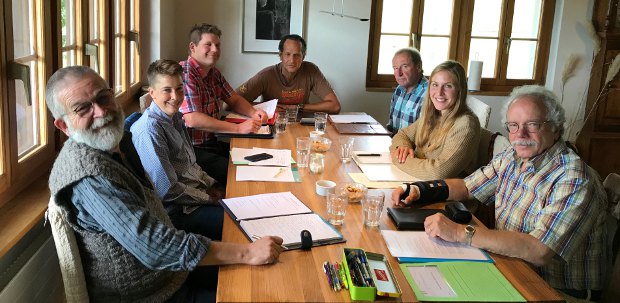
On 29 February 2020, the Swiss breeders of Alpine pig and poultry projects met for the pre-founding meeting of the new PatriMont-Switzerland national group. Fortunately, everything was already discussed in detail there, so that the actual foundation could be carried out from 3 to 14 April - due to Covid-19 - by means of a correspondence vote. On 6 June 2020 the appointed board of directors met for the first meeting. From left to right: Ulrich Egli, Actuary and Deputy Chairman; Dr.agr. Tanja Kutzer, Scientific Adviser; Niklaus Amstutz, Chairman; Arno Senti, Marketing; Silvio Caprez, Treasurer; Deborah Stadelmann, Breeding Manager Poultry and Hape Grunenfelder, Breeding Manager Alpine Pigs.
The Bisa dwarf cattle "has grown"
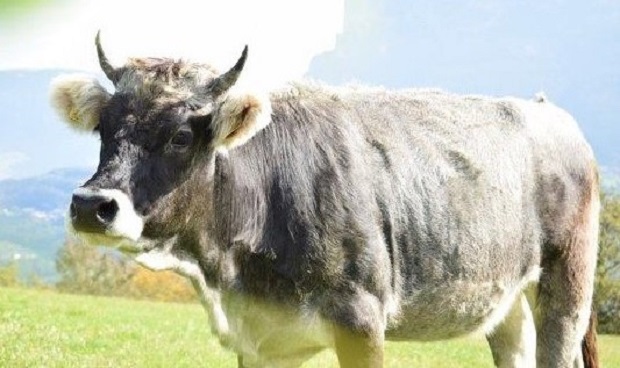
The breeders of the Bisa dwarf cattle of South Tyrol found themselves on the Renon on Martin Lintner's Egger farm and took the conservation of this indigenous breed of the south-eastern Alps a step further.
They agreed that:
- The German name of the breed will be "Buischa Grauvieh". With this the name is linked to the Gray Alpine breed, of which it is part. The Italian name remains unchanged
- Information boards will be made to increase the visibility of the project on farms. In addition, a brochure with further information will be produced
- The dates of all the animals kept in the area will be collected, in order to go ahead with targeted breeding
- Contacts will be created with the world of gastronomy to enhance the quality meat, convinced that this natural and genuine product at zero km is ideal for the sector.
PatriMont Annual Meeting 2019
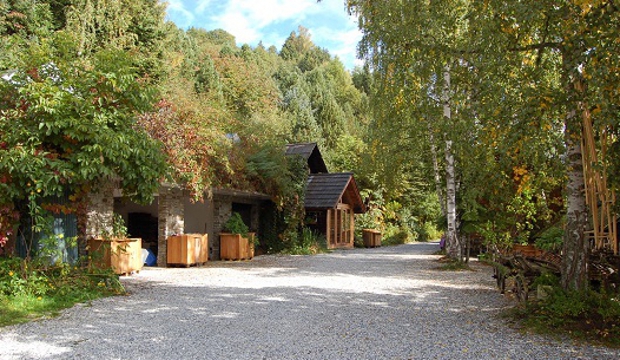
The alpine network Pro Patrimonio Montano is pleased to invite active and interested parties to the annual meeting 2019 in the Salzburg Lungau. This time we are guests at Krameterhof, a well-known pioneering and training farm for permaculture. We will also visit the Bergerhof, the highest located farm in Styria at 1450 m above sea level, where Christian Bachler keeps pigs free-range also in winter.
The meeting in Lungau will take place from 28th to 30th June 2019. The program and the registration form can be downloaded from the German and Italian part of the “Actualities”. The registration deadline ends on June 3rd, 2019!
First Alpine pig progeny in Switzerland
Among the first litters of alpine pigs after more than 40 years in Switzerland, these two piglets, who can't wait to excel at the Goldau wildlife park.
(Photo: Natur- und Tierpark Goldau)
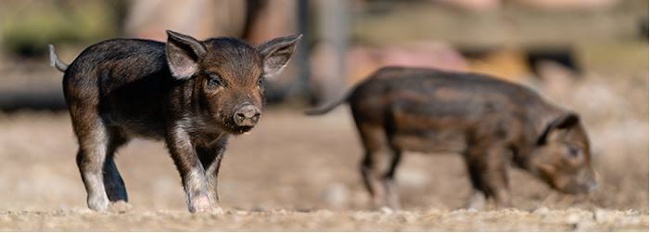
The black alpine pigs return successfully to Switzerland
Until a hundred years ago there were still numerous alpine pig varieties in the Swiss mountain area. These were gradually replaced by breeds on high performance. Last stocks survived until 35-40 years ago on both sides of the Lukmanier and Splügen pass. The repatriation of four breeding groups from the newly built stocks in North and South Tyrol was a protracted undertaking because of the tough Swiss veterinary regulations. The repatriation was concluded in the middle of August 2018 with a press conference at the Animal Park Goldau, where the two-month quarantine took place. PatriMont was able to count on the professional support of interested veterinarians and the financial support of SWISSLOS and four dedicated foundations. The photo shows an alpine pig couple in the Animal Park Goldau.
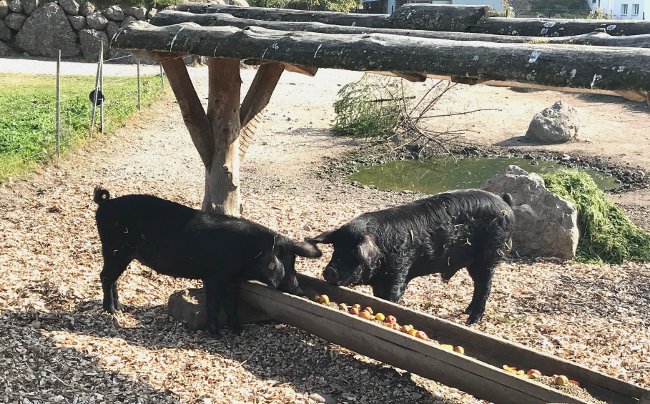
PatriMont-News Summer 2018
The PatriMont-News Summer 2018 (bilingual in German and Italian) with the main topics "Protection label for the Black Alpine pigs", "State recognition of the Ciuta sheep" and "Network for pre-alpine land geese" are published and can be downloaded here:
PatriMont-News_2018.pdf
Annual Meeting of PatriMont 2018
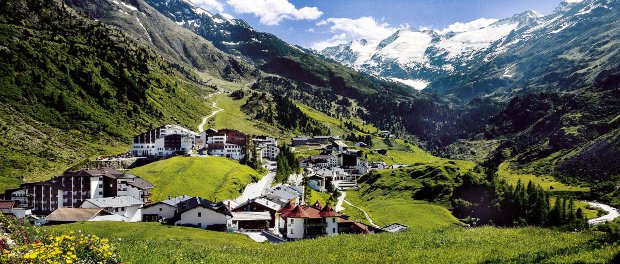
On 8th-9th September the Alpine Network Pro Patrimonio Montano helds its annual meeting in the Tyrolean Ötztal. Breeders will exchange experiences there; Sponsors, friends and interested people can get to know us there. All are cordially invited to the seminar hotel of the university center Obergurgl (www.uz-obergurgl.at).
The program and the registration form can be downloaded from the German and Italian part of the “Actualities”. The registration deadline ends on July 4th, 2018!
Folklore Museum Dietenheim, South Tyrol
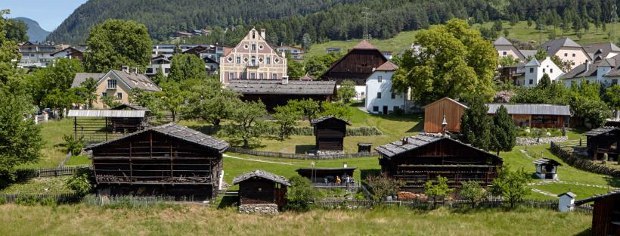
Animals in the open air site
Also in 2018 (until late autumn) you will find farm animals around different parts of the Museum's site, a variety of livestock – examples of now rare old alpine breeds as Black Alpine pig, Tyrolean chicken, Buischele dwarf cattle, Pustertaler Sprinze cattle, Blobe goat (blue goat), Ciuta sheep and Villnösser Brillenschaf sheep. This in cooperation with the Alpine network "Pro Patrimonio Montano", "Sortengarten Südtirol" and "Südtiroler Rinderzuchtverband".
PatriMont-News Autumn 2017
The PatriMont-News Autumn 2017 (bilingual in German and Italian) with a special topic "Culinary uses old breeds" are published and can be downloaded here:
PatriMont-News 2017.pdf
PatriMont has joined the European SAVE Network
Pro Patrimonio Montano was admitted to the European SAVE Network on 9 September 2017 at the SAVE Foundation's annual convention in Ponte de Lima, Portugal. The SAVE Network now links 23 national organizations and 2 regional organizations at European level. The SAVE Network Office is located in Wageningen (The Netherlands), the SAVE Project Office in St. Gallen (Switzerland). SAVE is an abbreviation for "Safeguard for Agricultural Varieties in Europe".
More information is available on the site www.save-foundation.net/?lang=en.
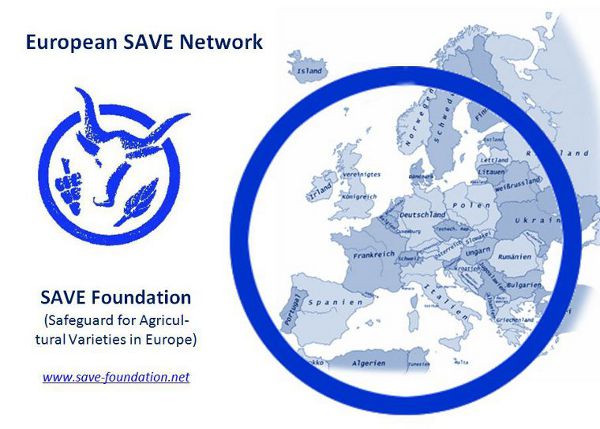
Annual Meeting of PatriMont at Bruneck-Dietenheim (South Tyrol)
The Alpine Network Pro Patrimonio Montano has grown rapidly with its projects. Therefore the necessary steps to further development were discussed at the annual meeting. What concerns the Tyrolean chickens:
- the new regional structure was confirmed and expanded
- the management of the breeding register will be simplifyed
- animals shall be supplied also furthermore only within the former distribution area (see section "Participation").
The Folklore Museum Dietenheim in South Tyrol's Pustertal, which shows this year all autochthonous livestock breeds in living groups, gave the meeting an excellent frame.
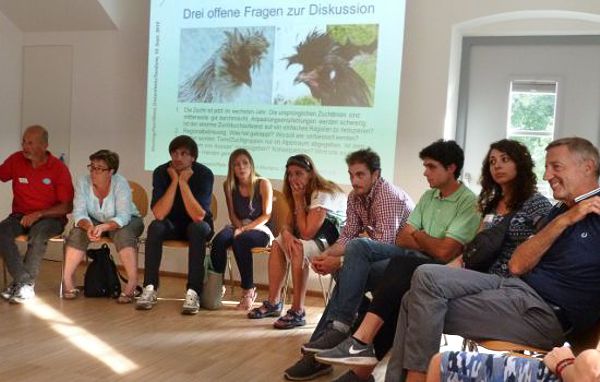
PatriMont-News Juli 2016
The PatriMont-News July 2016 with a special topic to Black Alpine pigs - but also to the keeping of roosters in residential centres and to combat mites - are published and can be downloaded here:
PatriMont-News_2016-07.pdf
PatriMont-News December 2015
The PatriMont-News December 2015 with a special topic on Tyrolean chicken are published and can be downloaded here:
PatriMont-News_2015-12.pdf
Patrimont-News 2014-11
The PatriMont-News November 2014 are published and can be downloaded here:
Patrimont-News 2014-11.pdf
Always up to date on Facebook
 If you want to be informed about the ongoing development of Tyrolean chickens, Ciuta sheep and black Alpine pigs you may subscribe to the Facebook site of Pro Patrimonio Montano at URL: https://www.facebook.com/patrimonio.montano
If you want to be informed about the ongoing development of Tyrolean chickens, Ciuta sheep and black Alpine pigs you may subscribe to the Facebook site of Pro Patrimonio Montano at URL: https://www.facebook.com/patrimonio.montano
The Network for old Alpine breeds is called new "Pro Patrimonio Montano"
With the new commitment to Ciuta sheep and black Alpine pigs, the main area of activity of the network has shifted from South-Tyrol / Western Austria / Eastern Switzerland to Trentino-Valtellina, ie from the German in the Italian-speaking world. Therefore it was decided to give the network a cross-language, Latin name, which is correct also in Italian.
The new name is added in the communication by a short explication sentence in German, Italian and English.

Takeover of further breeding areas
End of May 2013 Dr. Alessio Zanon from the Veterinary University of Parma , pig expert of the Italian organization for the conservation of endangered livestock breeds ( RARE ) , pointed out that a last group of small , black Valtellina pigs has survived in a Fattoria Didattica (school farm), but unfortunately will disappear. He asked to take conservation measures (Valtellina pigs are identical to the previous Grisons and Ticino pigs in neighboring Switzerland). In the knowledge that a breed is extinct before all the animals are dead, and because no one else was ready, the "Network for old Alpine breeds" - which among others is concerned with the backbreeding of the Tyrolean chicken - took over on an emergency basis these last black Alpine pigs.
